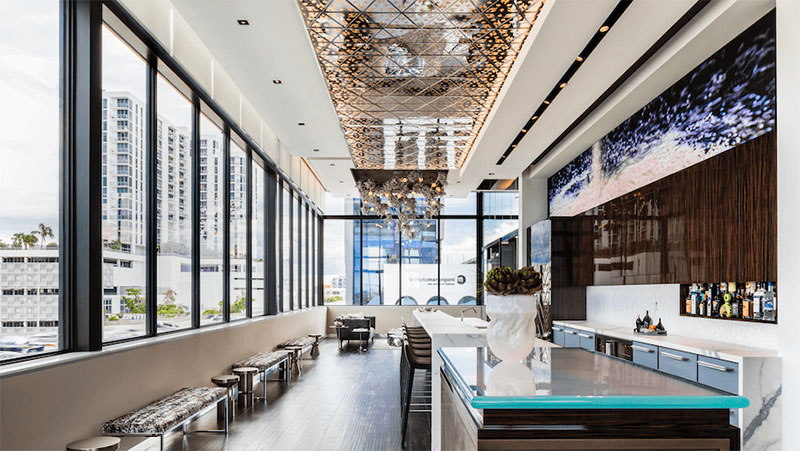Advertisement
Construction plans and specs, no matter how detailed, can often leave a developer and/or construction owner’s representative wanting when it comes to imagining precisely what their commercial or even residential construction project is going to look like. Even with artist’s and digital renderings, there’s still nothing like experiencing the real thing.
Enter the showroom. Says the owner’s representative from Paragon Development LLC in the stylish Miami, Fl, Design District, there’s no discounting the powerful affect a world-class showroom can have on potential clients. These showrooms are accentuated by their ultra-high-end lighting, luxury finishes, audio and visual features and modern digital “smart” controls throughout.
The climax of the sub-zero showroom performance comes with a live demonstration kitchen, complete with appliances, food prep kitchen, wine room, bar, conference room and even a roof-top event space that overlooks the stunning Miami Design District.
How is all this made possible? By the ingenious work of the developer’s owner’s representative. Just how important are owner’s reps in 2022? According to a new report by the American Bar Association (ABA), the past two decades have witnessed the steady growth of owner’s representatives in all segments and areas of the commercial and residential construction and development industry.
Taking into account their role on the owner’s end of a building team that includes construction manager and architect, the owner’s rep can have a direct and indeed, significant impact on a given project’s success or failure.
The Need for Project Advisory Services
The growing need for an owner’s rep in 2022 is said to be driven by a combination of economic risk and “growing technical complexity” that’s now associated with the modern construction project. The growth of new and much more complicated construction project delivery methods plus the “increased specialization of design professionals” such as architects and engineers who, once upon a time, served a secondary role as the owner’s rep.
Both public-sector and private developers are said to be retaining owner’s representatives who act as project advisors in order to supplement their administrative and internal management capabilities. They are also needed to fill in gaps in the services that are rendered by the construction contractor, the commissioning agent, and the design team.
Defining the Owner’s Representative
Say the construction law experts, when defining the role of the construction/developer’s owner’s representative, you need to understand the “range of terminology” that’s often utilized to describe the consultants. Owner’s rep, program manager, project manager, tenant representative, plus construction manager agent/advisor are oftentimes used interchangeably to refer to the firm or individual hired to represent the interest of the client/owner during the duration of the project, from showroom performances to project closeout.
The major problem with this interchangeable terminology is that it is downright confusing. Worse, it can lead to misunderstandings regarding the scope of responsibility and authority assigned to the consultants along with their scope of services which can vary depending upon the project. For instance, a construction renovation requires a different scope of work than a brand new stand-alone project.
The lack of uniformity in terminology, scope, and authority is said to often create “significant risk” for the owner and the owner’s rep. In the past, services provided by an owner’s representative were considered to offer little in terms of contract risk performance and/or professional liability.
But as the need for owner’s representatives has grown, their impact on the project quality, budgeting, performance, administration, and even scheduling has become significant. It also means the owner’s rep could very well be on the hook when things go wrong, which they all too often do on a construction project of any size.
Wide Range of Services
Again, according to the experts, the “basic scope of services” which are assigned to the owner’s rep is usually centered on project management, coordination of construction trades, project oversight, and also monitoring the design which can include the use of showrooms and finishing samples. That said, owner’s reps also handle project procurement and juggle all phases of any given project.
A more detailed look at what an owner’s representative provides is as follows:
–providing consultation and advice to clients on design (from layout to appliances), Value engineering (where costly items can be cut from the project budget), cost estimating, general and subcontractor prequalification, trade scheduling, project closeout and associated warranties, and more.
–oversight on a daily basis of the general contractor, plus subcontractor-material supplier delivery updates and quality control standards (adherence to project specifications and approved documents).
–assistance in overall project evaluation.

